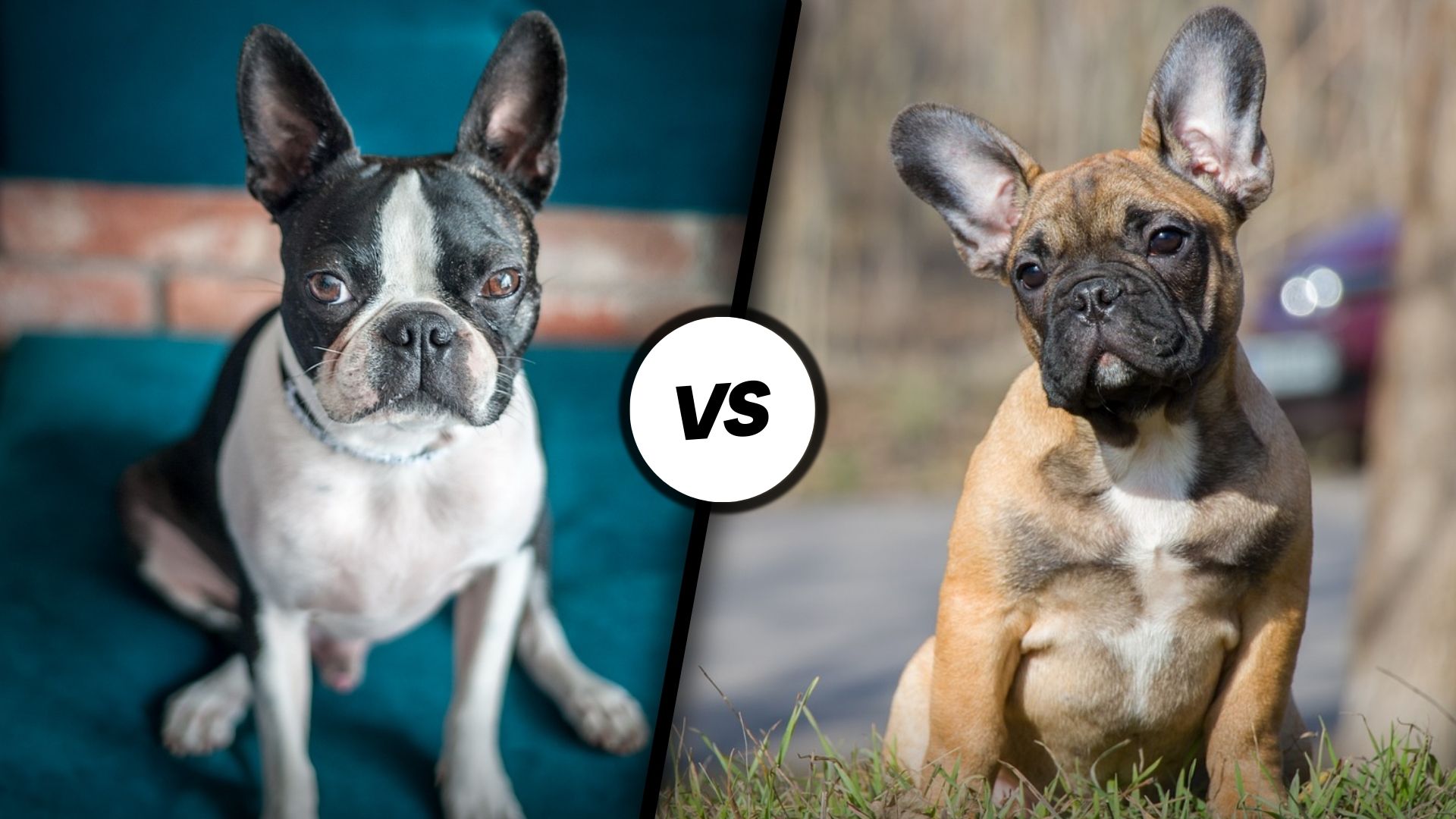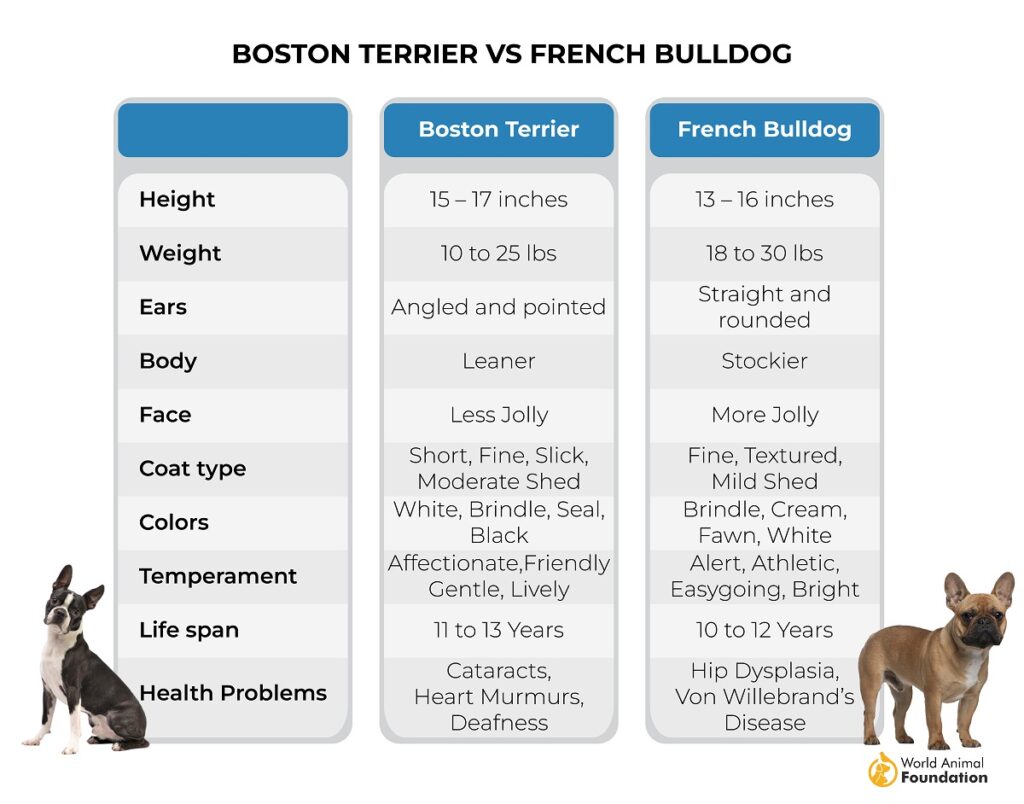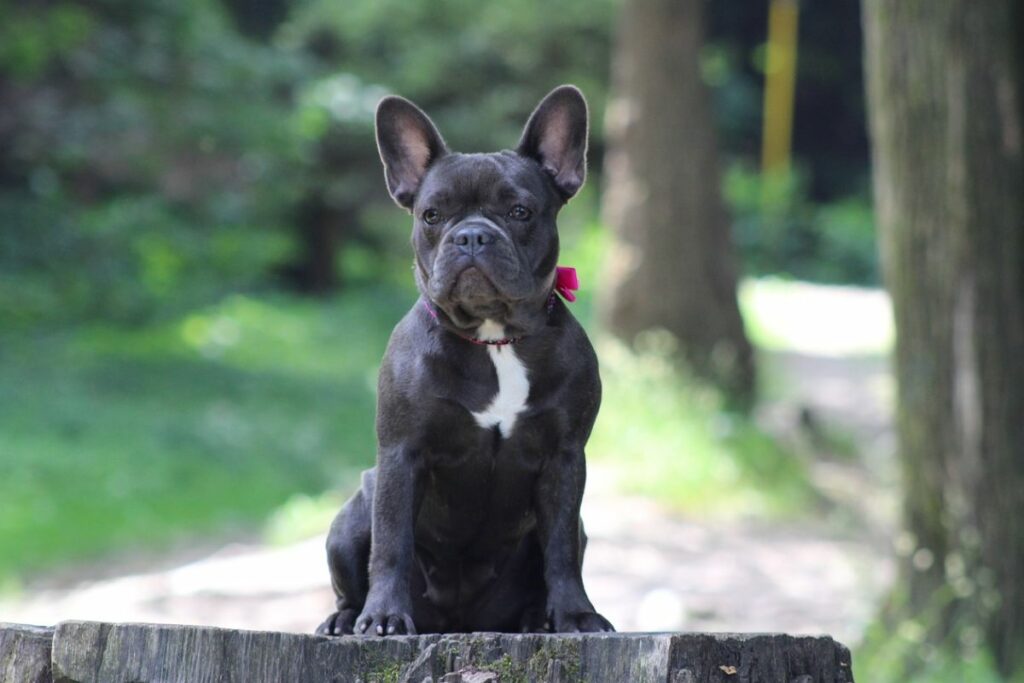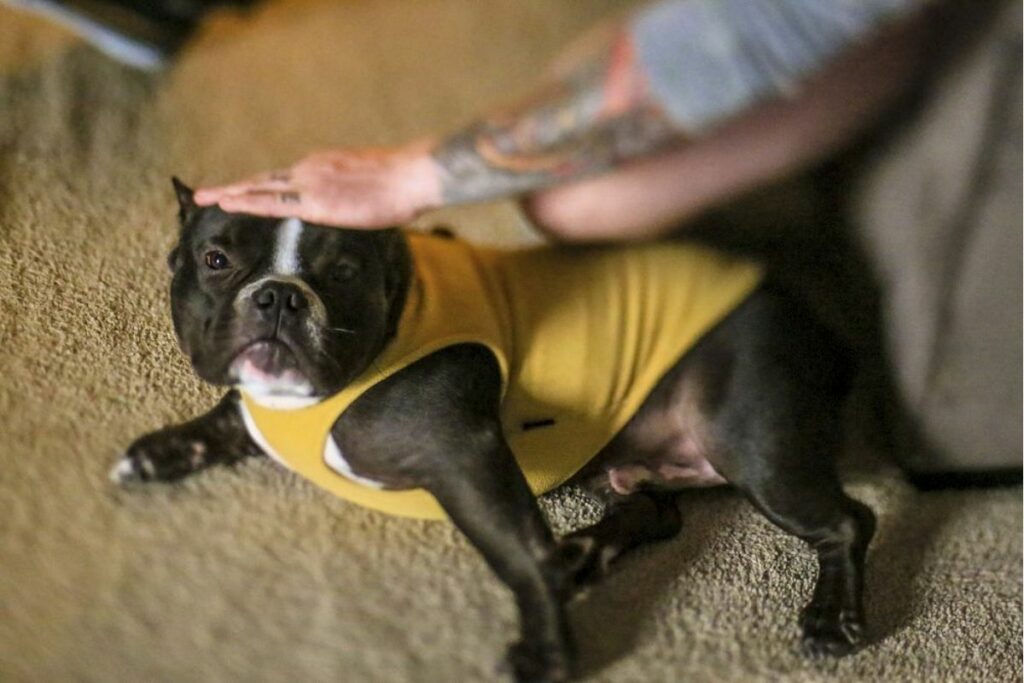Boston Terriers and French Bulldogs: often confused, yet distinctly unique. Their bat-like ears and compact builds spark the question, are they truly different? Beyond the superficial similarities lie key distinctions in size, temperament, health predispositions, and even snoring habits! This exploration delves into the nuances separating these two popular breeds, providing clarity for prospective owners and satisfying the curiosity of any dog enthusiast. Prepare to uncover the hidden details that make Boston Terriers and French Bulldogs each a breed apart.
“Cuties” was the first thing I thought of when I started writing this guide. These two breeds are so adorable, you may want to replace your kids with them. We’ll get into Boston terrier vs. French bulldog differences and similarities, so you don’t have to.
Spoiler alert: These two breeds are both family-oriented, so you’ll have a dog who wants to be in the middle of whatever you’re doing. Whether it’s hanging out with the family on binge-watching nights or getting ready for guests, they want to be involved.
If you want to know the background of these breeds or how much exercise they need, you’re in the right place. These small-ish dogs do have health issues since the breeding process got out of hand, but they deal with it like champs.
So, let’s begin and learn about these adorable breeds to find out if one of them just might be your perfect companion.
History of Boston Terriers and French Bulldogs
Called the “American Gentleman” for a reason, the Boston Terrier is quite the animal. They originated in Massachusetts, US, to just be… A companion, that is. The American Kennel Club (AKC) recognized them in 1893 as the first American breed.
You’ll have longevity with the Boston terrier since they live to be 11-13 years old, as well as the French bulldog who live to be 10-12 years old. (Although we never get enough time with our beloveds.)
So what’s their story?
In 19th-century England, blood sports, or dogs fighting dogs or other animals, including humans, were popular as entertainment. (I know. Sick, right?) In Liverpool, in the 1860s, a mix between a bulldog and an English terrier that’s now extinct produced a muscular dog named Judge.
Judge was sold to an American, William O’Brien, who came to Boston and sold him to Robert C. Hooper. Known as “Hooper’s Judge,” he became the initial ancestor of the Boston terrier we know and love today.
The terrier had been developed in Boston by crossing an English terrier with an English bulldog. Over the years, crossbreeding with the English Bull Terrier, the Boxer, the Pit Bull Terrier and the French Bulldog resulted in what’s now the modern Boston Terrier.
Boston University chose the breed to be its mascot, where it has remained for almost 100 years. In 1979, the state named the Boston terrier to be the official dog of Massachusetts.
Now Let’s Talk About the French Bulldog’s History
From Nottingham, England, in the mid-1800s, bulldogs were eventually relocated to France by travelers. After decades, the bulldog had been crossed with other breeds, and that’s when they developed their famous “bat ears” that make them so recognizable. The dogs were called Bouledogue Français.
French Bulldogs became the highlight of Paris café life with the social set. The “Frenchie” was then noticed by Europe and America in the 19th century, and they were recognized by the AKC in 1898.
Boston Terrier vs. French Bulldog: Difference in Appearance
Here we go with the Boston terrier vs French bulldog and their differences…
Boston Terrier
- Height: 15”-17”
- Weight: 10-25 lbs.
- Coat type: Smooth, short, single coat
- Marking and color: Standard marking with “tuxedo jacket”; Colors: Fawn & white, black & white, black brindle & white, brindle & white, seal & white, seal brindle & white
- Ears: Large, erect, angled, pointed
- Snouts: Flat
- Temperament: Social butterflies! They’ll welcome anyone who’s willing to stop and give them a nice scratch. They’re good with young children, other dogs, senior folks, and strangers. Boston terriers will let you know they’re there since they need to be stimulated both physically and mentally. If not properly stimulated, they might have excessive zoomies and possibly destructive behavior.
- Shedding: Low
- Activity level: Medium
- Health: Issues with Brachycephaly, eyes, and joints
In 2017, the Boston terrier was in the top 10 of the AKC’s 10 Most Popular Dogs. The eight in that top 10 with Brachycephalic breeds included the Boston terrier (and the French bulldog). Brachycephaly is a condition that affects flat-faced dog breeds. The symptoms are brutal, one of which makes it difficult to breathe, especially if they get overheated.
The eyes can also be an issue for the Boston terrier. You should check them daily for redness or irritation that could result in cataracts, ulcers, or glaucoma.
Watch what they eat since obesity can be a real problem. Patellar luxation and knee joint problems should be watched for as well. It’s not a good idea to heavily exercise them or allow them to jump from stairs or furniture.
French Bulldog
- Height: 13”-16”
- Weight: 18-30 lbs.
- Coat type: Smooth, short, single coat
- Marking and color: Black markings, white markings, black mask, spotted, brindle markings, piebald, ticked, tan points; Colors: Brindle, brindle & white, cream, fawn, fawn & white, fawn brindle, white, white & brindle, black, fawn brindle & white, white & fawn, blue, chocolate
- Ears: Large, erect, straight, rounded (Bat-like ears)
- Snouts: Flat
- Temperament: Playful, adaptable, and alert, the Frenchie will be by your side and probably wants to play or be petted. He’ll let you know. You will be alerted if anything seems amiss or if someone is approaching, but otherwise, they don’t bark often. They love everyone and will fit in with singles, couples, or families.
- Shedding: Medium
- Activity level: Medium
- Health: Number one – Brachycephia is a hereditary disease and is passed down when breeding. (French bulldogs also can’t swim, so never leave them alone near a body of water. They’re sensitive to anesthesia as well.) Eye conditions to look for: “Cherry eye” and cataracts. They can also develop skin issues.
Note: I dog sit for a French bulldog who recently developed Degenerative Myelopathy, which is a condition that can paralyze their hind legs and cause incontinence. He has been hit with both, and it’s incurable. The sweet thing is getting along well and acts like he doesn’t know anything is wrong.
Are Boston Terriers and French Bulldogs Family Dogs?
Both the Boston Terrier and French Bulldogs make great family pets, known for their affectionate nature and adaptability to home life.
Apartment Living
Boston’s activity level is just a little higher than “Medium,” plus they have “Medium” adaptability, so living in an apartment is fine with the right stimulation. Remember, since they don’t need to exercise excessively, stimulate their minds with interactive puzzle games or toys. Let them run around inside, especially if it’s humid outside.
They may be best suited to a single person, couple, or family who is staying in one place for a while.
The Frenchie’s activity level is “Medium,” and they’re highly adaptable, so apartment living is right up their alley. Keep them stimulated with those “brain puzzles” and play with them inside.
Training
With the “Bosties,” their trainability is “High,” so the training portion of the program should go fairly well. Like all breeds, early socialization (having them around as many animals, people, and situations as possible when they’re puppies) and obedience training are necessary.
Some Bostons are reported to be sensitive, so make sure you use positive reinforcement training and lots of love.
With the Frenchie, trainability is also “High,” so look for a good response time to commands. Be aware that they’re so smart they can be a bit stubborn, so be patient and stay consistent, making training a short, daily habit.
So, training Boston Terriers and French Bulldogs is easy, and they make great dogs for first-time owners.
Barking
Boston terriers tend to bark more than French bulldogs, but they’re certainly not yappers. They’ll let you know if something is truly bothering them. Frenchies are mostly quiet.
Cost
Boston terrier: $800-$2,000 depending on breeder location, pedigree, lineage, if it’s a show dog or not, and more
French bulldog cost: $1,500-$3,000+ depending on breeder location, pedigree, lineage, if it’s a show dog or not, and more
Considerations for Bosties and Frenchies Parents
Aspiring Bostie and Frenchie parents should consider the unique needs and personalities of these breeds to ensure a happy, healthy home for these endearing companions.
Prepare for Vet Visits
- Between vet visits, if you see anything unusual with your dog of either breed, write it down if it’s not something that needs to be looked at immediately. Take the list to the vet.
- If your dog isn’t accustomed to the car, take him for car rides prior to the vet visit.
- Take paperwork of any previous illness, including breeder information and any medications. (But we hope you’ll adopt!)
Prioritize Early Socialization
As soon as you adopt, begin training and socializing. Taking your dog to obedience classes is a wonderful way to do both. Also, take them to a place like Petsmart to meet people and other animals and invite friends over who have pets
Exercise Sessions
In general, since both breeds have “Medium” energy levels and are brachycephalic dogs, no long hikes or jogs should be in their futures. Short walks, giving them time in the backyard or free rein to zoom around the house, along with puzzle games, should be sufficient. Be sure not to over-exercise them. Let them “tell” you what they need.
Which Dog Will Suit You: Boston Terrier vs French Bulldog
I know a lot about dogs, and this is a tough choice for good reasons. Both Boston terriers and French bulldogs are affectionate and loving with family members. The Bostie has a bit more energy than the Frenchie, but they’re both highly trainable, good with other dogs, and welcome visitors.
Their shedding and grooming levels are low, so no need to bathe or brush them as much as you would some other breeds. Both are playful and will keep you laughing. Neither of them barks a lot, so your peace and quiet will be safe.
They love to be with you, so even if you’re out and about, take them along. Just make sure to keep them cool. Boston terriers and French bulldogs will delight and steal your heart. Either choice is the perfect one.
FAQ’s
Which Is Better: Boston Terrier or French Bulldog?
Neither one is better than the other. These are both exceptional breeds and make excellent companions.
What Is the Temperament of a Boston Terrier French Bulldog Mix?
“Frenchton”
- Sweet-natured
- Sociable
- Loving
- Intelligent
- Strong-willed
Are Boston Terriers Brachycephalic?
Yes. Flat-faced dog breeds are generally brachycephalic, which can cause breathing problems, among other issues.
What Is the Difference Between a Boston Terrier and a Boston Bulldog?
A Boston bulldog is a hybrid (mix) between an American “pit bull” terrier and a Boston terrier. They will take on the physical characteristics of both. They’ll be a little larger than a Boston terrier and also might inherit health issues from the bully breed side. Additionally, they may or may not have a flat face.
Final Thoughts
Aren’t these two breeds delicious? You can’t go wrong with either one, so Boston terrier vs French bulldog has no winner in that department. They have some differences since each is a unique breed, but the traits they have in common are usually positive.
Look for these breeds at your local shelter/rescue or a breed-specific rescue. And whether you get a Frenchie or a Bostie, you’ll have a Bestie.
While both Boston Terriers and French Bulldogs share a charming bat-eared appearance and affectionate personalities, key differences exist. Bostons are typically more energetic and athletic, excelling in canine sports. Frenchies, with their stockier build, prefer shorter bursts of activity. Coat variations, potential health issues, and even subtle differences in temperament mean prospective owners should carefully research both breeds. Ultimately, the “best” breed depends on individual lifestyle and preferences, but understanding these distinctions is crucial for a happy, harmonious match.









